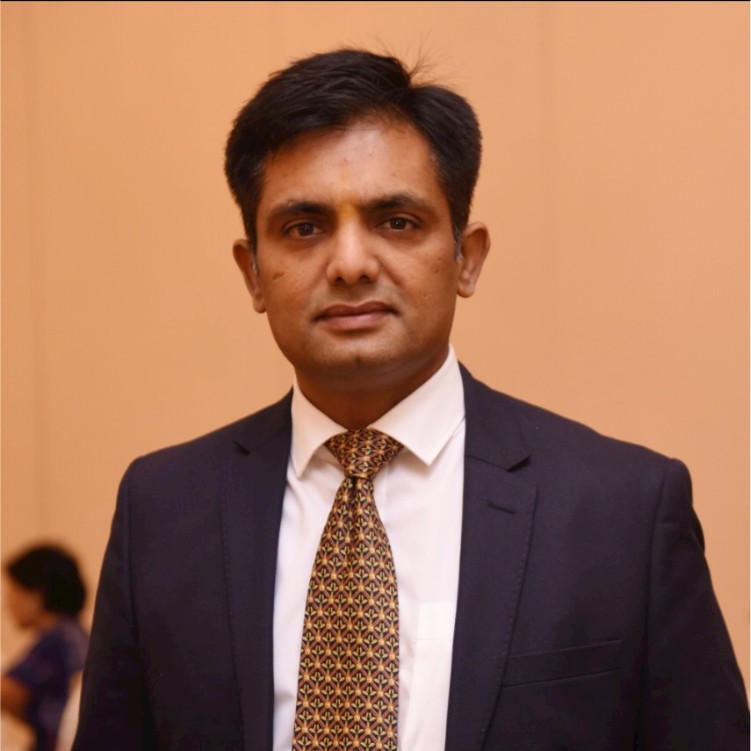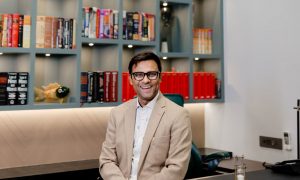This interview has been published by Namrata Singh and The SuperLawyer Team

Sir, what inspired you to make your career in law? while you did that, you became a managing partner at Praveen Pathak, and Associates so would love to hear about your journey.
Allow me to provide you with some context initially. I didn’t start my professional journey as a lawyer; I was a financial consultant at ICICI Prudential and other financial institutions. My perspective shifted during the aftermath of the 2008 Lehman Brothers collapse, witnessing individuals earning substantial annual incomes suddenly losing their jobs. The realization that our profession lacked job security prompted me to reevaluate my career.
As someone accustomed to starting my day early and returning home late, the prospect of idleness after losing my job was challenging. Despite facing this situation, I didn’t share my predicament with my family. It was during this time that I stumbled upon information about the legal profession, which intrigued me. Although I had heard during my studies that law was a demanding field, my background in understanding people’s needs and navigating complex situations made it seem less formidable.
Being solution-oriented has always been my approach, and I bring this mindset to the legal profession. I see myself as a provider of comprehensive solutions, not just for individuals but for entire families and the corporate world. Many people, especially newcomers, lack a clear understanding of what they are getting into when pursuing a legal career. I take it upon myself to guide them and emphasize that the legal profession is inclusive, extending to everything from environmental concerns to the rights of individuals, unborn children, and even those who have passed away.
In discussing our current conversation, conducted over the internet, I highlight the universality of legal solutions. Where there are rights, there are remedies, applicable to every individual seeking solutions. Despite the observed gap in training within the Bar Council of India, I believe organizations like LawSikho play a crucial role in bridging that divide with their wealth of knowledge. I express this sentiment genuinely, independent of the fact that I’m being interviewed by someone associated with LawSikho.
How was it when you were with ICICI Prudential? And then all of a sudden, you had to switch jobs you rather had to switch professions. What kind of impact does it have on you? I would say mentally, and professionally. And how is it that your family cooped up with it?
To be completely candid, the impact of certain events has a profound influence on one’s life. The pivotal question is: How do you choose to navigate that impact? Is it a stumbling block that knocks you down, or do you transform it into a stepping stone for reaching new heights? Personally, I have always viewed every impact as a stepping stone, an opportunity for growth and learning. Life itself is a series of impacts—from the moment of birth when we know very little, to the present moment where I find myself being interviewed, answering questions about my experiences.
Life, much like a movie, unfolds, and through its narrative, it imparts valuable lessons. The key lies in our readiness to comprehend and appreciate the teachings that life imparts. The collapse of Lehman Brothers, for instance, presented me with a golden opportunity. It wasn’t just a setback; it was a chance to glean essential insights and evolve. Life constantly provides opportunities for learning, and recognizing them can lead to remarkable personal and professional development.
Could you provide insights into your legal responsibilities in your role as Vice President at P&P Advisory? How do you manage the dual responsibilities of being a Managing Partner and a Vice President simultaneously? You are essentially an authority figure in these roles. Moreover, how do you ensure effective outreach to a broad audience, serving as a guide and mentor to the maximum number of individuals? Can you shed light on your approach to fulfilling these mentoring responsibilities?
I attribute the perceived success that people recognize in my journey to the dedicated networking efforts spanning over 15-20 years. Many individuals, who started their endeavors at various points in time, found a connection with me at some intermediate level, and our relationships flourished. I offered my services, and one key takeaway for anyone reading or hearing this is the importance of nurturing relationships at every stage of your life and career.
Regardless of your current status or level, if you foster meaningful connections and contribute value to those relationships, the network you build over time will become increasingly robust. I emphasize the significance of evaluating and offering solutions within your relationships. When you place your solutions or products on this network platform, the people connected to you will embrace them with open arms.
Throughout my career, I cultivated connections with individuals in advertising agencies, corporate companies, financial institutions, home loans, and banks. The welcoming reception I received was a result of the commitment and assurance I consistently provided. When I made promises and commitments, they were backed by the legacy of 20-25 years of experience. Venturing into the legal field without a specific legal background or a legal “Godfather” was made possible through my strong connections with corporates and individuals. This network enabled a rapid and successful transition for me.
Transitioning from a finance background to law was facilitated by your network, but the aspect of your humble behavior—how has that contributed? These insights must reach new learners so they can understand the significance of humility, positivity, and perseverance in building a successful network and career. Your views on this would be invaluable, and if you could share a motivational message—whether it’s two lines or ten—I believe it would greatly resonate with those seeking inspiration.
For all the learners out there, here’s a piece of advice: Take a moment to look around, find ten people on your left and another ten on your right. Say hello, introduce yourself as a lawyer, and commit to standing by them through thick and thin. Building a network is not just about connecting; it’s about being there when they need you. Regardless of your background—whether in law, finance, or any field—the key is to be a good human being.
In every interaction, be considerate rather than demanding. Adopt a solution-oriented approach; be a problem solver. When someone approaches you with a legal issue, don’t jump straight into litigation—consider alternative solutions like amicable settlements. By becoming someone who provides solutions, you not only gain respect but also establish yourself as a reliable and valuable resource.
Understanding people’s problems is crucial. Everyone faces challenges, and your role as a solution provider extends beyond legal matters. A practical example is akin to a pharmacist directing a customer to another store for a specific medication. By doing this, you not only solve the problem but also position yourself as a one-stop solution for various needs, be it financial or otherwise.
If you aspire to specialize, focus on areas that interest you. Form a team with like-minded individuals who share your passion, especially if you are pursuing a practice rather than traditional employment. For those seeking self-employment, your value is paramount—you are your own shop. Be considerate, offer valuable solutions, and remember that sometimes people simply need affirmation, even when they already know the solution. A sincere and valuable presence is often all that’s needed.
What insights would you offer to newcomers, especially in terms of patience? Could you share your personal experience, the struggles you encountered, and the valuable lessons you gleaned?
One crucial aspect to note is the shift in perspective from using the term “struggle” to “challenges.” In a world where effective communication is a skill set we possess, with a vast market and numerous products available, the issue is not about selling itself. The real challenge lies in approaching the right objectives. Rather than struggling to make a sale, the focus should be on meaningful connections. Starting with a goal of meeting 50 people is a simple yet effective way to initiate this process.
A significant challenge many face is reluctance to discuss legal matters due to shyness or a lack of confidence. Building this confidence is a critical step. It involves addressing challenges systematically, step by step, just like counting from 1 to 5. For newcomers, starting with straightforward legal matters like negotiable instruments or straightforward divorces is a practical approach. These areas do not require rocket science to understand, and I extend an invitation for anyone eager to learn to visit my office for a week of free lessons.
Offering free services in areas like recovery matters or consumer cases serves a dual purpose. Firstly, it allows individuals to learn through practical application, and secondly, it creates a lasting impression. By providing a solution free of cost, you become imprinted in their minds as a reliable resource.
Importantly, the challenges are not external but internal. It’s about being open to adopting new approaches and being willing to learn. The real battle is not against external forces but within oneself, and the key is to stand up, confront those internal challenges, and keep moving forward.
If we step into your shoes as an individual practitioner collaborating with startups and corporates, what new challenges emerge, and what insights have you gained from these experiences? Do you believe that encountering these challenges contributes to personal and professional growth, irrespective of whether one is a first-generation or second-generation lawyer? Moreover, how do you perceive these challenges shaping you as an individual beyond your role as a lawyer?
Let’s approach it as challenge number one, not a struggle. Challenge number two: proactively engage in tasks. Reach out and express your willingness to assist, saying, “I’d like to do this for you. Can I help?” In an environment where everyone seeks help and wants someone to handle their responsibilities, spending time working diligently for others becomes crucial. However, a significant hurdle arises—there seems to be a shortage of students who are willing to adapt, choose to work, and invest time.
I apologize for being candid, but the reality is that only about 10% of individuals exhibit a serious commitment. The remaining 80% may talk about struggles but often fail to take meaningful action. It’s essential for individuals to reflect on their choices and question whether they are truly dedicated to the work.
Personally, I believe that 20% of people are inherently eager and capable of comprehending and implementing the tasks discussed here. For the remaining 80%, a common pattern emerges—expressing a desire for progress without corresponding action. This might sound straightforward, but it’s crucial for people to evaluate whether they are genuinely aligned with the work they’re pursuing.
I never instruct my juniors or interns to handle my files, as they are not clerks. Instead, I encourage them to spend time understanding the workings of a clerk, as it forms the foundation of their background. Clerks are invaluable resources and are willing to share their insights and solutions. Regarding the assignments provided by LawSikho, completing them is a significant step—accomplishing them means covering 70% of the necessary groundwork.
Commendably, LawSikho is doing remarkable work, and its impact should extend to a broader audience. I believe that 70% of individuals who may not have completed half of the assignments would significantly benefit from the institution’s initiatives. The world is replete with opportunities for those willing to explore, but success requires genuine willingness and dedication.
Reflecting on your global presence, can you elaborate on the notable differences you’ve observed between the local world, particularly around 2005-2006 before the Lehman Brothers crisis, and the transformed global landscape that emerged afterward? What broader societal impacts have you witnessed, particularly in the context of India opening up to the world?
Understanding the world today is far more accessible and straightforward than it was in 2019, let alone in the early 2000s. The transition from the graduating class of 2000 to the present generation is marked by the significant introduction of artificial intelligence, shaping an era where answers to virtually every question are readily available. The abundance of opportunities may appear daunting to some, but it’s essential to recognize that every perceived threat carries an inherent potential for benefit.
Embracing new technologies and staying informed is crucial. Even a tenth-grade student from a reputable public school can guide you through these innovations. In the context of COVID times, I recall having a busy schedule while many were not yet comfortable with Zoom meetings. Surprisingly, more than 50% of lawyers were sitting at home, and I had a substantial workload during that period.
Staying informed about your surroundings and current market trends is now easier than ever. Regularly reading newspapers allows you to engage in meaningful conversations about ongoing events. Keeping yourself updated through specific magazines or newspapers tailored to your field is equally important. Additionally, being part of a peer group or a community of lawyers provides valuable insights and support. Networking within a group of legal professionals creates an environment where lawyers can share experiences and knowledge, contributing to collective growth.
Highlighting the significance of research, how crucial do you consider it for individuals, whether they are lawyers or chartered accountants? You mentioned that during the COVID period, you experienced an increase in workload beyond expectations. Could you elaborate on how research played a pivotal role during that time and how it contributes to your knowledge, especially in areas such as artificial intelligence? What has been your approach to learning and staying informed in these domains?
I firmly believe that there’s no substitute for hard work, and by hard work, I mean rigorous research. Often, we overlook the importance of taking the time to thoroughly read the complete orders passed by the Supreme Court. Understanding why a single judgment spans multiple pages and carries various connotations is essential. It demands patience, dedicating long durations to continuous reading, sometimes up to 30 or 45 minutes for a single judgment. Complaining about the length becomes invalid when you realize that this comprehensive approach is critical to the legal profession.
In the legal realm, research should be an integral part of your daily routine. Just as a chef deals with spices and ingredients, a lawyer should engage with extensive reading. This practice provides a wealth of material to discuss and forms the foundation for constructing well-informed opinions. The readings you engage in essentially lay the groundwork, making reading and researching indispensable elements in the legal profession with no substitutes whatsoever.
You’ve consistently emphasized positive changes extending beyond the legal fraternity and the legal realm. Could you share insights into the initiatives and activities you’re involved in? Additionally, how do you envision your contribution to creating a better world for Homo sapiens, as you often express? What specific proposals or strategies do you have in mind to achieve this vision?
Survival hinges on three essential elements: air, earth, and water. Understanding the crucial link between our well-being and the environment, I emphasize the importance of giving back. Unfortunately, in the pursuit of development, the environment often faces exploitation with limited legal intervention. Those studying law or engaging in environmental materials must recognize this responsibility.
To address these concerns, I’ve initiated the JAL THAL VAYU Foundation. While its success may be uncertain, the aim is to inspire action. JAL represents the need to cleanse rivers and oceans, emphasizing water harvesting. Simultaneously, we encourage tree planting and other earth-centric activities under THAL. It’s a simple call to action – if you’re a lawyer, plant five trees. Engage in climate movements. This is not just charity; it’s a shared responsibility for everyone, you, me, and the entire community. The interconnectedness of air pollution, water, and soil underscores the significance of every action we take. By planting a tree, we contribute to supporting all three vital elements.
Get in touch with Praveen Pathak-























